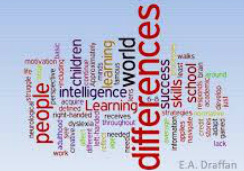
But, as we all know, there are students who learn differently. They gradually stand apart from everyone else at school, because they can't do the thing that school requires them to do. School is set up for natural readers. They capitalize on this ability and go with the flow. Students who cannot develop this easy fluency gradually fall behind, are marginalized in subtle ways, and eventually, in the words of Gladwell, "stand apart". The result tends to be a major assault on their feelings of self-worth. They feel less competent, less able, and definitely, less bright. As Nadine Gaab, a dyslexia researcher at Harvard, comments:
Maybe you were the cool kid on the playground when you were four. Then you entered kindergarten and all of your peers suddenly started reading, and you can't figure it out. So you get frustrated. Your peers think you're stupid. Your parents think you're lazy. You have very low self-esteem...It's because you can't figure things out. It's so important in our society to read.
So, if students with learning differences can't capitalize on the same skill sets as their peers, what can they do? At our school we explore alternative pathways with our students. New ways of making connections, new strategies to replace the standard ones that simply don't work. It is often difficult, and frustrating, and always time consuming. But eventually it pays off. Gladwell calls this alternative to capitalization, learning by compensation.
Compensation learning...(needing to scramble and adapt and come up with some kind of strategy that [allows the learner] to keep pace with everyone around him)...is really hard. Memorizing what your mother says while she reads to you and then reproducing the words later in such a way that it sounds convincing to all those around you requires that you confront your limitations. It requires that you overcome your insecurity and humiliation.
This, if successful, says Gladwell, actually might force you to develop skills that "might otherwise have lain dormant". The fact of the matter is, that it is not only the outcome of blazing new pathways to learning that is important, but it is also the the process of trial and error; of failure and success; and of resilience in the face of seemingly daunting challenges that can change a learner's life.
Our students learn by compensation, and in doing so, they open up a world of different possibilities!


 RSS Feed
RSS Feed
